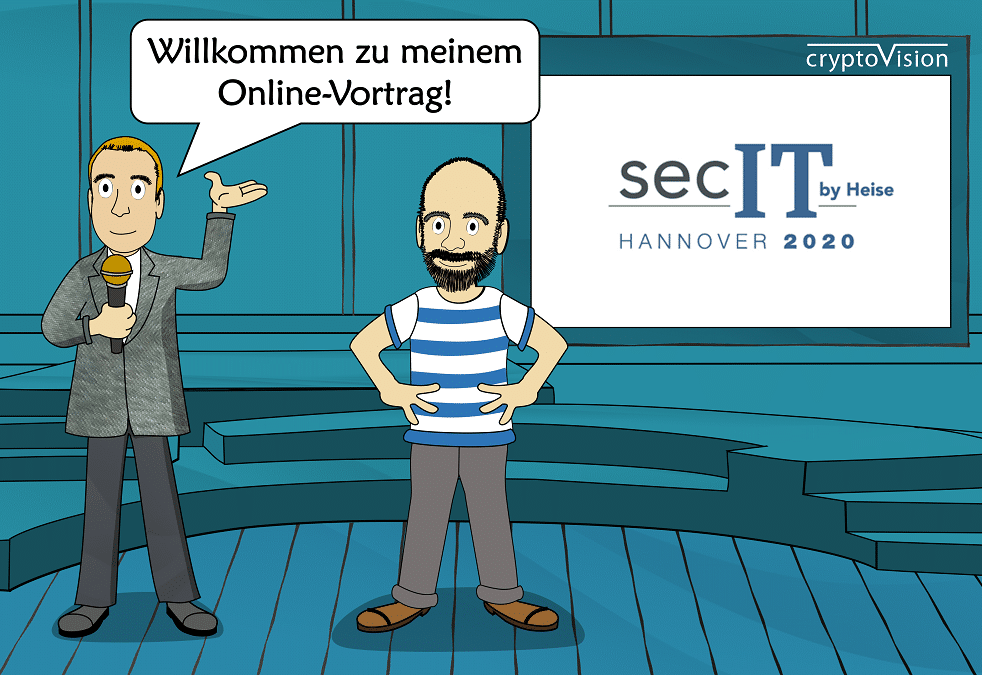
by Klaus Schmeh | Apr 2, 2020 | Event
The SecIT 2020 in Hanover was to become a real highlight for cryptovision. Klaus Schmeh, Chief Editor Marketing at the Gelsenkirchen-based specialist for cryptography and electronic identities, was booked for a lecture, where he was to be on stage together with Bruce Schneier. Schneier is considered the most famous cryptologist in the world.
But then came the corona crisis, and with SecIT 2020 Schmeh’s joint appearance with the prominent partner fell through. At least, the organizers reacted quickly and converted the conference into an online event, which took place a few days later. The agenda was reduced, with both Schmeh and Schneier retaining their presentations. On 30 and 31 March, the virtual SecIT finally took place. Klaus gave a video conference on quantum cryptography before Schneier spoke live from the USA about Incedent Response. Though a virtual lecture was an unusual experience because of the lack of personal contact with the audience, Klaus’s engaging presentation style and his popular comic slides once again did their job. In the online forum it was quickly agreed: the experiment was a success, but even the best online event cannot replace a face-to-face gathering.
SecIT website: https://sec-it.heise.de/

by Klaus Schmeh | Mar 19, 2020 | General
“I’m at the home office right now.” As good as everyone has heard that phrase several times over the last few days. No wonder, because in the times of the coronavirus, working from home is as much a part of everyday life for many people as breathing masks and empty supermarket shelves. According to the German industry association Bitkom, one in three professionals in Germany is currently working in a home office for the first time, while for 43 percent, existing homework regulations have been extended.
Inevitably, the issue of security now comes into focus, because remote access should of course only be available to authorized employees of a company, and not to hackers.
Centrally managed company laptops or tablet PCs protected by endpoint security measures can usually be securely integrated into the corporate network using a virtual private network (VPN) enhanced with two-factor authentication (e.g. with a company ID). However, if a company has not yet implemented an endpoint security concept, a VPN is not sufficient. Instead, a sealed-off VDI (Virtual Desktop Infrastructure) is necessary, as it can be implemented on the server side with solutions from VMware, Citrix or Microsoft.
On the user side, both a fat client (for example via RemoteApp/RemoteDesktop) and a thin client can be used. A product bundle cryptovision offers together with partners such as IGEL, IBM or genua is best suited for this purpose. In such a solution, cryptovision’s smart credential middleware SCinterface is integrated, so that the user can log on in the home office with a secure two-factor authentication and does not become a security risk (think of phishing or attacks on the client system). Since SCinterface supports all common cards and security tokens, a company can also use existing Smart Credentials for the home office VDI.
You want to know more about cryptovision’s solutions for the secure home office? Our colleagues will be happy to advise you.
SCinterface website: https://www.cryptovision.com/en/products/secure-token-integration/sc-interface/
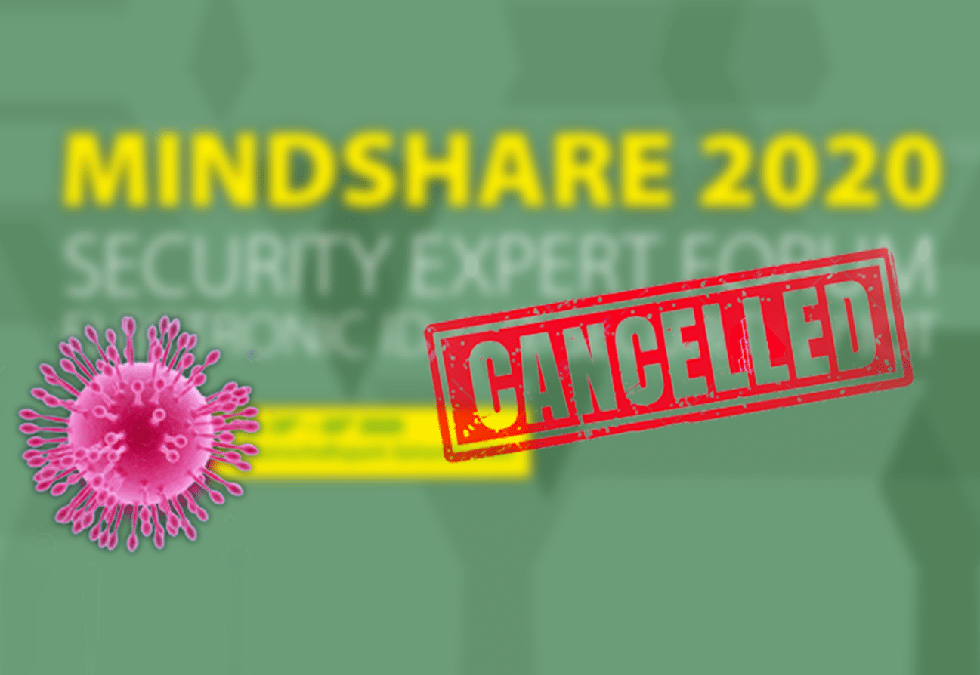
by Klaus Schmeh | Mar 13, 2020 | Event
It is with great regret that we have to announce the cancellation of this year’s Mindshare Conference. In the current situation, due to local restrictions as well as our own assessment, it is not possible to have our annual event in Gelsenkirchen. We very much care for our customers, partners and friends and want to make sure you are all staying safe. We are looking forward to meeting you next year in Gelsenkirchen. To get the latest information on Mindshare 2021 please subscribe to our newsletter.
Mindshare website: https://www.cryptovision.com/en/mindshare-2020/
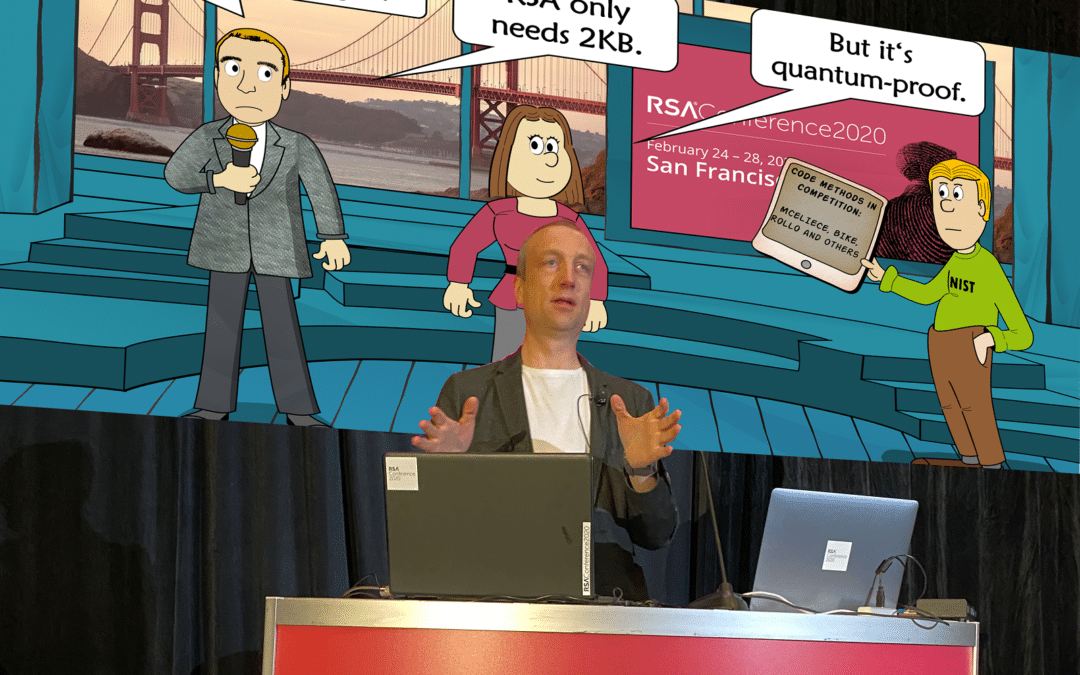
by Klaus Schmeh | Mar 3, 2020 | Event, General Conferences, Webnews
“The program committee was blown away by your Powerpoint slides”, said a member of the organizing team at RSA 2020 to cryptovision’s Klaus Schmeh. As one of very few Germans, Klaus was chosen to give a presentation at the conference part of the event, which represents the world’s largest crypto gathering with over 45,000 attendees. Titled “Understanding and Explaining Post-Quantum Crypto with Cartoons”, the talk introduced the main post-quantum crypto algorithms with every slide showing a cartoon. Over 200 people in the audience proved as blown away by the presentation as the program committee.
cryptovision’s Adam Ross gave a talk, too. At the German-American IT Security Forum, hosted by the German industry association, TeleTrusT, he spoke about “Securing the Internet of Things – Embedded Security Made in Germany”.
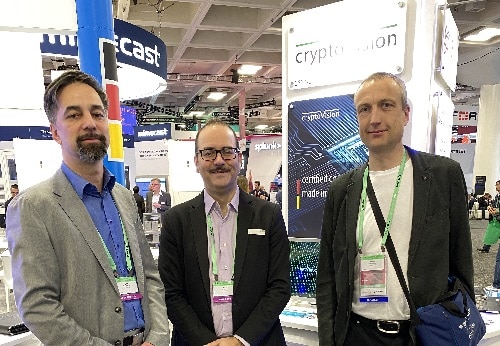
Along with their co-worker Lutz Feldhege, Adam and Klaus ran a booth at the German pavilion of the exhibition part of RSA 2020, showcasing cryptovision products such as the smart credential middleware SCinterface and the PKI solution CAmelot. With about 600 booths, RSA once again qualified as the largest crypto exhibition in the world. Cryptovision is proud to have been a part of this great event.
Event website: https://www.rsaconference.com/events/us20
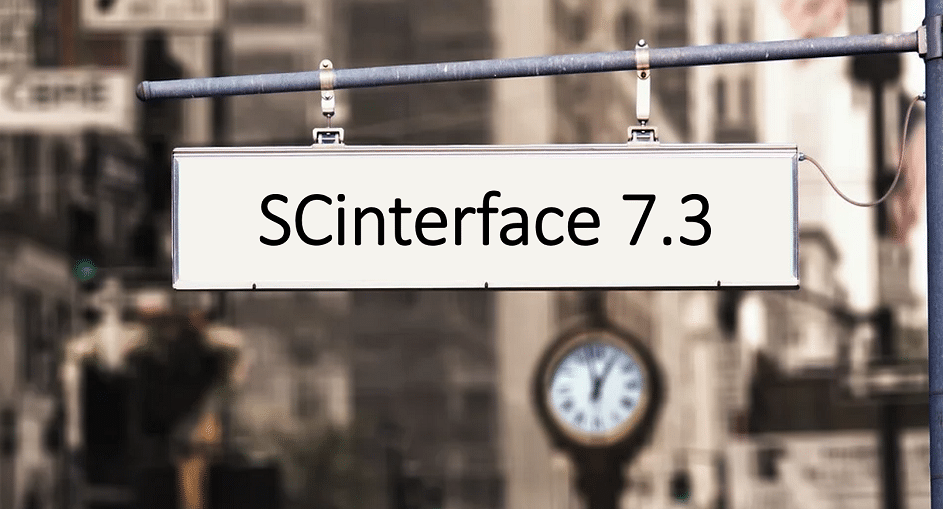
by Klaus Schmeh | Dec 20, 2019 | Products
cryptovisions smart credential middleware SCinterface is released in the new version 7.3. SCinterface now also supports macOS 10.15 (Catalina) and via SCinterface Utility the dark mode of macOS – good news for all Mac users. The configuration of PIN caching with SCinterface Cache has become much more flexible – it can be done according to time, predefined key usage or application, whereby whitelists as well as blacklists are possible. All variants can be combined at will. The flexibility of PIN caching increases the level of security. SCinterface 7.3 also supports additional cards, tokens, profiles and operating system versions. Not least due to the constantly growing number of interoperable solutions, SCinterface will remain the product of choice in 2020 for the use of Smart Credentials in applications of all kinds.
SCinterface product page: https://www.cryptovision.com/en/products/secure-token-integration/sc-interface/
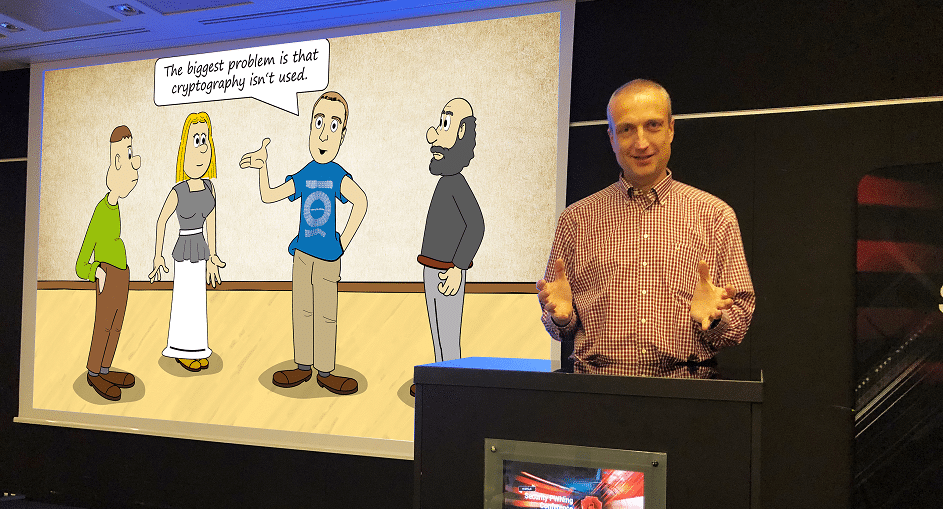
by Klaus Schmeh | Nov 20, 2019 | Event
Encryption is an important thing – but it is used far too rarely. This was the message of the keynote lecture held by cryptovision employee Klaus Schmeh at the Security PWNing on 15 November in Warsaw. With almost 1000 visitors, Security PWNing is one of the most important IT security conferences in Eastern Europe. The hacker Gynvael Coldwind, who chaired the program committee, had engaged Schmeh because he has appreciated his presentation style – with a lot of humor and self-drawn cartoons – for years. Coldwind and the rest of the audience were not disappointed. Schmeh not only relentlessly revealed the shortcomings of the current (non-)use of cryptography, but also presented interesting solution strategies. The new magic word is “human-centred cryptography”. The human being has to be the focus of attention, then encryption will work.
Security PWNing website: https://www.instytutpwn.pl/konferencja/pwning/
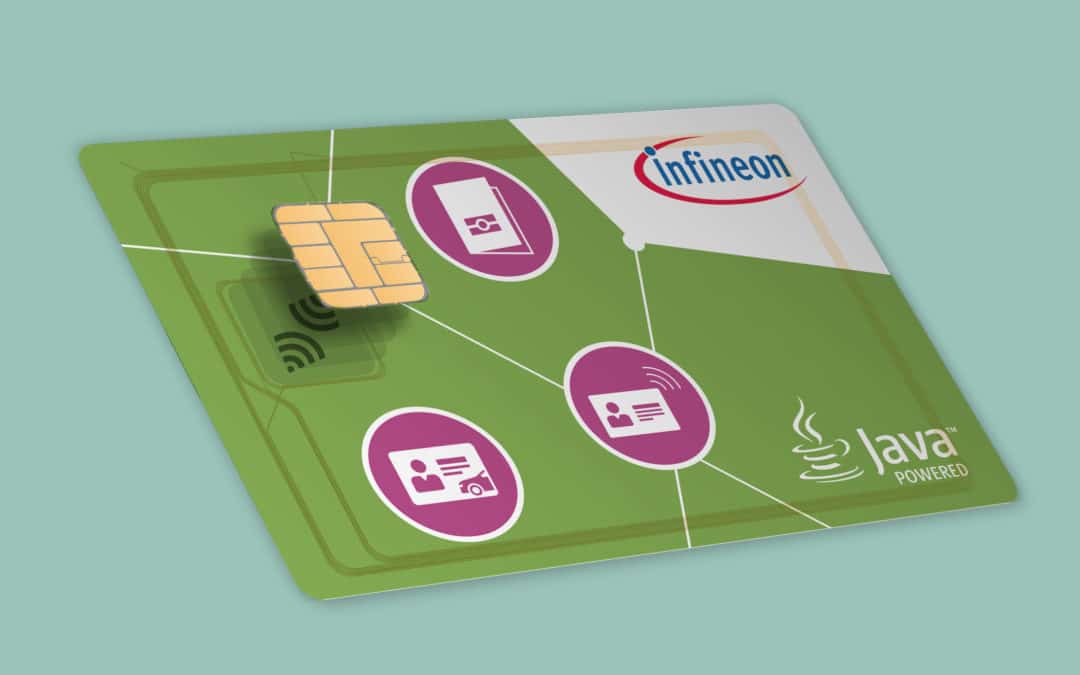
by cryptovision | Nov 14, 2019 | General, Webnews
ePasslet Suite v3 – cryptovision’s Java card framework for electronic ID documents – will be available in 2020 on SECORA™ ID, Infineon’s new Java card operating system. Using ePasslet Suite, users of SECORA™ ID can easily and flexibly implement numerous eID functions. SECORA™ ID is the newest member of Infineon’s established SECORA family. SECORA™ ID is a smart card operating system based on the widely used Java Card standard. It was specifically developed as a platform for electronic ID cards.
SECORA™ ID is being certified according to Common Criteria EAL 6+ and EMVCo. In addition to Infineon’s in-house applet collection, SECORA™ ID also supports the proven ePasslet Suite by cryptovision. This solution considerably expands the functionality of SECORA™ ID by offering about a dozen additional applications. All common eID documents can be implemented this way, with a wide variety of configuration options as well as adaptations to national and project-specific requirements being possible – including electronic identity documents with several applications. The functionality includes the addition of applications on documents already issued.  Cryptovision’s managing director Markus Hoffmeister: “We are delighted that Infineon customers can now use our suite on this new platform. The partnership with Infineon is another important milestone on our successful path in the eID market”. With Infineon’s SECORA™ ID as additional platform for ePasslet Suite, cryptovision gains access to another huge market: 70 percent of the worldwide population use identification documents based on Infineon’s security chips. To the Infineon press release
Cryptovision’s managing director Markus Hoffmeister: “We are delighted that Infineon customers can now use our suite on this new platform. The partnership with Infineon is another important milestone on our successful path in the eID market”. With Infineon’s SECORA™ ID as additional platform for ePasslet Suite, cryptovision gains access to another huge market: 70 percent of the worldwide population use identification documents based on Infineon’s security chips. To the Infineon press release
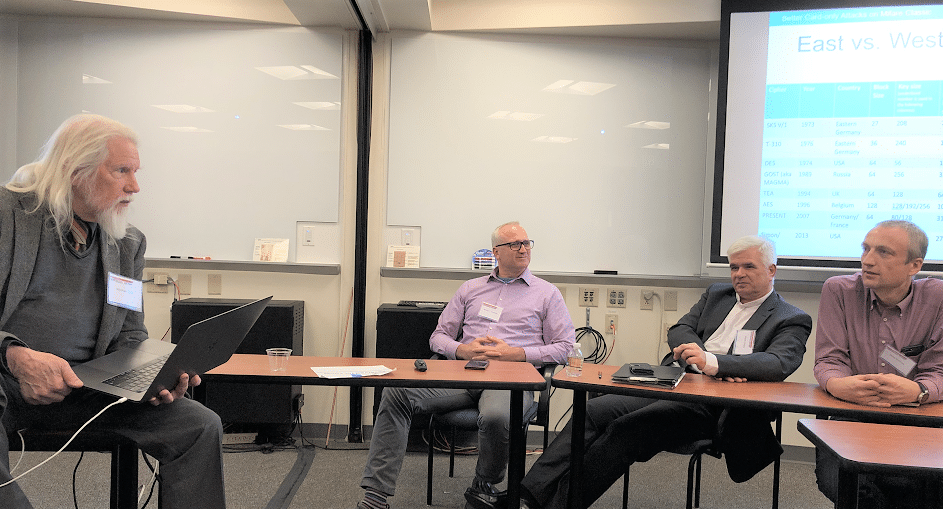
by cryptovision | Oct 31, 2019 | Event
For the sixth time in a row cryptovision employee Klaus Schmeh was a speaker at the renowned NSA Symposium on Cryptologic History in Washington, D.C. This event, organized by the NSA, brought together 350 experts from all over the world in mid-October, including numerous NSA employees. One of Klaus’ two lectures (on block ciphers) took place within a panel together with three well-known cryptology colleagues. One of them had contacted Schmeh a few weeks before the event and asked if he could participate in the panel: Whitfield Diffe, the co-inventor of the Diffie-Hellman key exchange and co-founder of asymmetric cryptography – and thus one of the most important computer scientists of our time. Klaus, of course, agreed, and the result was a prominent panel with exciting lectures and expert discussions, which was one of the highlights of the symposium.

by Klaus Schmeh | Oct 31, 2019 | General
The EuropeanCyberSecurityMonth is in full swing. Again this year, in October, numerous companies and associations from all over Europe are participating in campaigns to raise awareness of cyber security. Private individuals and companies are sensitized to responsible behaviour in virtual space. Even today, IT security and encryption are still too often neglected. However, it is well known that the need for secure communication is rising rapidly.
With the increasing networking of people and things in everyday life (IoT), the degree of digitization only knows one course – it is growing exponentially. This also increases the demand for encryption concepts and intelligent solutions for secure digitization in almost all areas.
From discounters around the corner to security communication in the secret service – cryptovision GmbH solution concepts find an answer to the dangers of the digital world. This includes the technical security device (TSE) developed for Bundesdruckerei for cash register systems and the VS-NfD approved e-mail and file encryption software GreenShield: In Germany alone, sales tax fraud causes damage worth billions every year. The cryptovision GmbH with its TSE provides more security in the tax system – so that each tax paid by the customer at the cash register arrives at the intended places and does not disappear into private bags.
With the state certified VS-NfD E-Mail and file coding solution GreenShield, the cryptovision GmbH provides safe digital communication in secret protected authorities and enterprises.
Since its establishment in the year 1999 the cv cryptovision GmbH stands for user friendly cryptography solutions. With its well-balanced product range of electronic ID cards, e-mail and file encryption and fiscalisation solutions, cryptovision contributes significantly to the protection of digital identities and communication. The key to the application of security solutions lies in simplicity, user-friendliness and reliability. Therefore, the dynamic 60-person team of cryptovision GmbH is working hard this month to improve existing and develop new user-friendly encryption solutions in order to further optimize our proven products and create new solutions. And so we make – not only in October – our concrete contribution to the EuropeanCyberSecurityMonth!

by Klaus Schmeh | Sep 27, 2019 | Event
Max Paul, one of the most important smartcard experts worldwide and partner of cryptovision, is celebrating his 50th birthday. For this reason, he invites all interested parties to the Digitall Day on October 3, 2019 in Mödling near Vienna, Austria. It goes without saying that cryptovision accepted this invitation. Besides the managing directors Markus Hoffmeister and Marco Smeja, further employees of the company will be on site. cryptovision expert Klaus Schmeh will slip into the role of a cybercriminal and give important tips in a (nearly serious) lecture. Participation in the Digitall Day is open to anyone who is interested, only registration is required. Participation is free of charge.
Digitall Day website: http://www.cardeas.at/agenda/digitallday/agenda








 Cryptovision’s managing director Markus Hoffmeister: “We are delighted that Infineon customers can now use our suite on this new platform. The partnership with Infineon is another important milestone on our successful path in the eID market”. With Infineon’s SECORA™ ID as additional platform for
Cryptovision’s managing director Markus Hoffmeister: “We are delighted that Infineon customers can now use our suite on this new platform. The partnership with Infineon is another important milestone on our successful path in the eID market”. With Infineon’s SECORA™ ID as additional platform for

